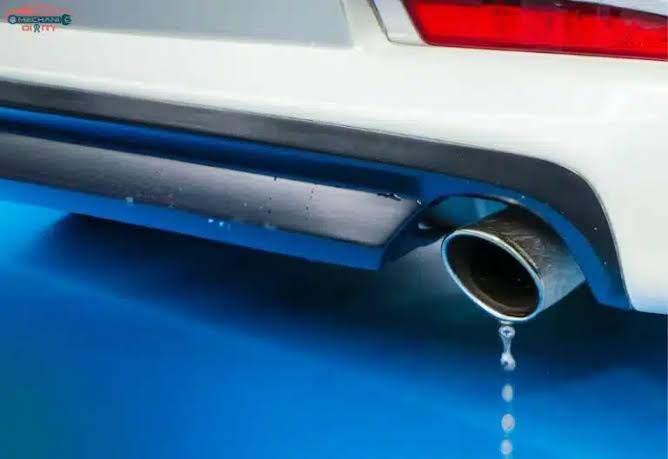------ AUTOMOBILE 101 ------
I know you must have heard that when water drops from your exhaust it means your engine is in good condition.
Well you may be right but not all the time because it could mean your engine is about to park up.
Now let's analyze some of the reasons:
1▪︎ When an engine is off and cools down completely and exhaust gasses leaving the combustion chamber, condensation of water, nitrogen and carbon dioxide takes place and you will notice water dripping from your car exuhst.
(Similar thing that happens on top of your pot cover when your cooking)
2▪︎CATALYTIC CONVERTERS.
When the exhaust system exhibits toxic carbon gasses, the catalytic converter is responsible for filtering and reducing these gasses, compress them and push them out through the exhaust. As this is going on some amount of water vapor is formed as a result which later forms little water droplets that now come out of your exhaust.
(If your catalyst is bad, blocked or stolen or you installed those locally fabricated ones you may not notice this again)
3▪︎ ENGINE HEAT.
Engine generate the highest amount of heat when you first start the car especially in the morning. This is because oil have not circulated well so the moving parts of the engine generates a lot of heat because of this.
Also, if you live in an environment with cold temperature, you will notice water dripping from your exhaust when the engine is on. This is because when the engine gets hot the heat merges with the cold air inside the engine and exhaust chamber and forms condensation and dropping from the exhaust tailpipe together with WHITE smoke.
4▪︎ FAULTY PISTON AND HEAD GASKET (Top Gasket )
Sometimes if you have a faulty Piston, rings or head gasket it can make water leak into the cylinder and come out through the exhaust. In this case this water that comes out is normally accompanied by BLACK SMOKE with a burning smell above all the car will be having shortage of coolant, you will be forced to be toping the radiator water now and then. The car will be running high temperature too.
5▪︎HUMAN FACTORS.
We have so many of these, example:
car wash operators sometimes mistakenly pump in water into the exhaust with their nozzle.
Bad road too. If u have cracks on your exhaust line, as your swimming in and out of pot holes and ditches your exhaust could be drinking dirty water and expell them out through the exhaust.
6▪︎AIR TO FUEL RATIO.
This is where most of us always fail our cars.
Engines use fuel and oxygen for combustion. For better combustion certain amount of fuel and air is needed and that is called AIR-FLOW RATIO.
Example, for proper combustion:
1% of Petrol need about 16.5% of Air (1 : 16.5), sa.e with kerosine and diesel but this ones are higher.
When the Air-Fuel Ratio is abnormal than the normal ratio the air fuel mixture is said to be TOO LEAN or TOO RICH (ie more air than fuel or more fuel than air).
In this situation if you scan the car it will give you codes: P0171 and P0172 etc.
WHAT ARE THE CAUSES?
▪︎Dirty Air Filter
▪︎ Dirty/ Faulty Mass Air Flow (MAF) sensor.
▪︎Faulty Oxygen sensor
▪︎Leaking/Bad fuel injector or nozzle allowing little or too much fuel into the combustion chamber.
▪︎Bad Spark plugs.
▪︎ Faulty Fuel Pressure/ Fuel dampers etc.
>>>> SOLUTION <<<<
Give your car best maintenance and cleanliness.
A workman who ate Agege bread with pure water for lunch can't give you same performance compared to one that ate a plate of pounded yam with correct Egusi soup and fresh fish.
> Use better oil for your car you no gree!!!
> Change your air filter you no gree instead you take it to vulcanizer to blow for you.!!!
> come attend our Diagnostic Training so you know how to fix some things yourself you no gree.
> Oya scan your car to know why that check engine light is on you no gree because your mechanic told you it doesn't matter, now you expect water to be dropping from your exhaust abi, your dreaming.
Go and finger your exhaust first, If its dry or have water vapour your doing well but if its dry with black smoke everywhere your the cause.
Go and do the needful.
©️Engr Gozie Atueyi

Comments
Post a Comment
Wish to leave a message?